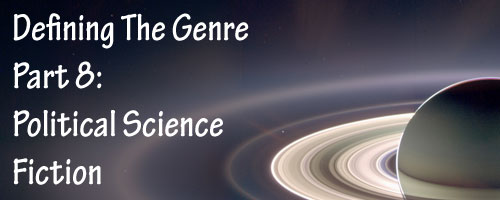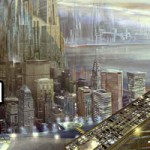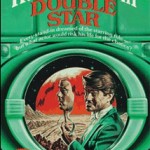
Politics is a subject that has been hot on everyone’s tongue lately, and while it’s a subject I usually refrain from, when it comes to science fiction I will make an exception. For some authors science fiction isn’t just about science, it is about politics. Many authors have used the genre to explore their political beliefs or outrage at the political machine. Such authors include Robert Heinlein, Sherri S. Tepper, Isaac Asimov, Frank Herbert, Ursula Le Guin and many more. Whether or not the main thrust of the story is to be political, political science fiction is very important and relevant today. Besides a good read, what can we actually get out of political science fiction? A lot more than you’d realize.
Science fiction is about exploring the possibilities and experiencing things that it would be impossible for us to experience in the here and now. They’ve played with machines, artificial intelligence, and aliens, so why not speculate where politics are going to head? In the science fiction genre there are many analogies to current and past politics and government organizations, allowing authors to explore political possibilities that may never be tried. Behind almost every military science fiction there is the political wheel that turns the war, much like in Robert Heinlein’s Starship Troopers (1959). Also, there is the government regulation and oversight such as the regulation of androids in Philip K. Dicks Do Androids Dream of Electric Sheep (1968). As with other subgenres of science fiction, it is not mutually exclusive. If you have ever read stories of empire building or intergalactic battles being waged, you’ve read political science fiction.
While you or I might not think of Jonathan Swift’s Gulliver’s Travels (1726) as a contemporary example of science fiction, it is a winning example of how fiction, of any genre makes a political statement. Gulliver might have been discovering new and unknown people here on Earth, but what Swift was really highlighting was the political machine and climate during his time, much like Voltaire did with his story of men from out of this world in Micromega (1752). They were outsiders looking in on Western Society and politics and could point out the flaws (Hassler, 10). While surely satire, as evidenced by these two works, can be an example of how politics and the government can be portrayed not just in science fiction but in literature on the whole, it is not the sole avenue by which writers explore politics.
It should be mentioned however that the examples of satire listed above usually spring out of an oppressive regime of government. Sometimes though they are not always satire. Novels like George Orwell’s Ninteen Eigthy-four (1949) is a cautionary tale against what oppressive governments are capable of. Other authors of this type of literature are Ayn Rand, Aldous Huxley, and Yevgeny Zamyatin. All of these authors depict dystopian societies, and through science fiction and political commentary they show the potential oppressiveness of the government and the loss of the individual. Anyone who has read these, I would think, would be looking over their shoulder afterwards and maybe should be looking at their governments a little more closely.
Not all authors were concerned about our political climate, but rather the imagined political climates of worlds and empires yet known. Isaac Asimov’s Foundation (1951) tells of saving civilization after the Galactic Empire fell. Government was manipulated through religion, pure politics and trade. His books stipulated that humans have been and always will be fundamentally the same, and this is more than on a “mob mentality” way but politically as well. With the exception of rogue political elements, people will go on much the same as they always have, and that is why politics in human existence is predictable (Roberts, 57-58).
This was not the only concept present at the same time Asimov was writing. Authors like Robert Heinlein questioned the way politics worked, and in his novel Stranger in a Strange Land (1961) he is even deeply critical of not only modern society but modern politics as well. The main character shuns the way that things are done on Earth and begins teaching the way it was done on Mars. This is conceptually similar to Voltaire’s perspective of the outside man looking in. In Starship Troopers, in order to have full citizenship and the right to vote, one must have military experience. This promotes the political belief that service comes before citizenship. If you are willing to fight for your country, only then are you worthy of casting a ballot.
Politics don’t always have an exclusive influence on science fiction, though. Sometimes science fiction has an affect on politics. Several government agencies have science fiction counterparts, both on a recognized level and on a more subtle level. Some events in our history have even been influenced by the science fiction that came before it. For example, NASA’s Space Shuttle Enterprise was named after the Starship Enterprise from Star Trek after a letter writing campaign. (Weldes, 2) While the Enterprise itself never made it into space, it was the first Space Shuttle ever built by NASA and marked the beginning of Space Shuttles as we know them (Grinter).
Political Science Fiction is the media through which we can explore possible governmental institutions, point out the follies of our own political system, and experiment with new ideas. It can play across the world stage, the galaxy, or the universe as a whole. The only limit, as with all other forms of fiction, is the imagination. Often political science fiction can be a cautionary tale of an oppressive government, but it can also try and prove that other political avenues are just as viable. Whether it is purely political or what may seem an afterthought, politics will always be behind a great deal of our science fiction.
Recommended Reading
- Ursula K. Le Guin – The Dispossessed
- Robert Heinlein – The Moon Is a Harsh Mistress
- Poul Anderson – A Man to My Wounding
- Aldous Huxley – Brave New World
- Philip K. Dick – The Man in the High Castle
- L. Neil Smith – The Probability Broach
- John Barnes – The Merchants of Souls
- Margaret Atwood – The Handmaid’s Tale
- George Orwell – Nineteen Eighty-Four
- C. J. Cherryh – Downbelow Station
Resources
- Grinter, Kay. “Enterprise(OV-101).” 03 Oct. 2000. John F. Kennedy Space Center. 10 Nov. 2008 <http://www-pao.ksc.nasa.gov/kscpao/shuttle/resources/orbiters/enterprise.html>.
- Hassler, Donald M., and Clyde Wilcox, eds. Political Science Fiction. New York: University of South Carolina P, 1997. 10.
- Roberts, Adam. Science Fiction. New York: Routledge, 2006.
- Weldes, Jutta, ed. To Seek Out New Worlds : Exploring Links between Science Fiction and World Politics. New York: Palgrave Macmillan, 2003.







What well thought out piece on science fiction and politics. Thanks, that was really interesting. I wish I could add something more, but you’ve pretty much listed all of my favourite political sci-fi.